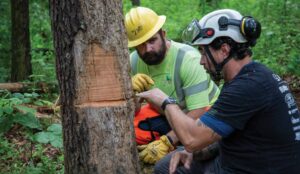These days you can’t open a newspaper, watch television or turn on your computer without hearing about the downturn in the economy, and how there are no jobs available. It all seems so hopeless. But, it’s not true.
In fact, there are plenty of jobs available in the U.S. Unfortunately, there are not enough qualified people to fill them. According to the World Economic Forum, more than 600,000 jobs are currently unfilled in the manufacturing sector alone. This figure seems at odds with the unemployment rates that have become a media mainstay over the past several years.
Sixty-seven percent of respondents in a 2011 manufacturing skills gap study indicated they were experiencing a shortage of qualified workers – with 12 percent reporting severe shortages and 55 percent indicating moderate shortages, according to the Association for Career and Technical Education.
Jim Nelson, Vice President of External Affairs for the Illinois Manufacturers’ Association (www.ima-net.org) says, “There are thousands of jobs in a wide array of options for people looking for a great career. In Illinois, we are looking at replacing 30,000 production workers alone every year until at least 2025, due to the retirements of the baby-boom generation. Nationally, that number skyrockets to over 6,000,000 each year. So, for those who suggest a lack of jobs in the U.S. or Illinois, nothing could be further from the facts. Moreover, manufacturing has career opportunities for those who work best with their hands, and those who prefer working in the design phases. It’s truly a melting pot for any person who loves to make things.”
With so many people out of work, how can so many jobs be open?
The real problem is a considerable gap between the skills American workers have and the skills they need to perform in the contemporary industrial workplace.
“Employers face many challenges in finding employees,” says Nelson. “Our communities, in general, have to do a better job with every student who struggles with mathematics and science, the so-called STEM subjects (Science, Technology, Engineering and Mathematics). Production processes today require workers to have good math and computer skills in order to be successful in today’s advanced manufacturing environment. Surprisingly, many employers also report serious shortcomings in work ethics among applicants such as arriving on-time, being dressed appropriately for work, working as a member of a team, etc.”
These soft skills, such as attendance, are a big problem for time-sensitive work in which manufacturers need to fill orders quickly to stay competitive.
Community college collaboration
In Illinois, a group of community college systems and manufacturers have banded together to create an initiative to help address the problem.
Jean Anne Grunloh, Executive Director of the East Central Illinois Development Corporation says, “The focus of the East Central Illinois (eci) Super Region Collaboration (www.ecidc.com) has been to raise community awareness on the advanced technology career opportunities in manufacturing. Our region provides several technical trades training programs to enter that allow students to advance in those careers.”
The kind of awareness Grunloh speaks about is crucial to changing the perception of just what a manufacturing career entails.
Mike Cline, former Training Manager for Danville-based ThyssenKrupp explains, “ThyssenKrupp is continually challenged in the selection process to employ personnel with the necessary skill sets, experience, or technical education level that is beneficial to succeeding within our highly technical manufacturing process.”
Although there are still a few jobs available that fit the traditional assembly line model, most modern manufacturers now employ advanced machinery requiring a specific skill set.
“We have been incredibly lucky to be a rapidly growing technology firm nestled in the heart of the Midwest,” comments AnnMarie Cross, Human Resources Manager for Watchfire Signs (www.watchfiresigns.com). “Because we are so vertically integrated – from software engineering to PCB manufacturing, from creative arts to accounting – we have a huge range of opportunities available to the next generation of employees. Our surprisingly complex technology means we have a higher than anticipated need for STEM-strong employees, ideally with education and/or experience in fields such as electronics, hardware design, software engineering, IT, manufacturing technology and more.”
Growing our own
As you can see, many of these jobs require more than a high school education. To that end, companies are reaching out to higher education to form partnerships with which to cultivate their workforce.
Cross says, “It has become ever-increasingly evident that we need to ‘grow our own,’ particularly in areas of engineering and IT. In eight years we have expanded from having two or three interns that are working toward an A.S. in electronics, to our 2013 program, which involved 24 university interns plus not-yet-freshmen. We are proud to boast that 12 percent of our non-union staff began at Watchfire as interns, and that former interns now hold full-time positions in nearly every department of the company.”
“Virtually every job in manufacturing today requires some post-secondary education,” agrees Nelson. “High school diplomas alone just aren’t enough. That’s why the IMA Education Foundation agreed to lead the Manufacturing STEM Learning Exchange in Illinois (www.ilpathways.com). The STEM Learning Exchange is a collaborative effort by manufacturers, educators, community organizations and others to align programs of study between high schools, community colleges and four-year institutions designed to prepare students for careers in manufacturing, and create a pipeline of skilled workers.
“Many schools already offer classes in machining and welding, for example. What the Learning Exchanges are doing differently is engaging additional skilled occupations such as quality control, mechatronics, robotics, process technology, and teaching kids industry-created, nationally-portable credentials,” continues Nelson. “This approach also encourages students to continue their education at the college level while working. There are more than 450 certifications available in manufacturing today, and virtually every credential is recognized by manufacturers in Illinois.”
The need for qualified individuals is so prevalent, Lake Land College (LLC) entered into a new partnership with North American Lighting (NAL – www.nal.com) to create the NAL Fast-Track Tech Program, an eight-week training course that guarantees employment at NAL upon completion of the program.
“There is a manufacturing boom throughout our region and the college. Together with North American Lighting and area legislators, we developed this program in order to respond to this immediate need quickly and effectively,” explained Jim Hull, Vice President for Academic Services at Lake Land College in Mattoon (www.Lake Landcollege.edu).
The program will provide students with a variety of industrial technology skills including shop safety, applied mathematics, robotics and automation control. Additionally, the 16 credit hours earned upon completion of the program count toward an associate degree from Lake Land College. To that end, NAL will offer educational benefits to employees who choose to complete the associate degree program.
“This is a fantastic opportunity for the right person,” says Steve Duval, Corporate General Manager at NAL. “By successfully completing the program at Lake Land, the student will receive a paid position with NAL plus an additional nine weeks of training in the facility. Furthermore, they can continue their education with tuition assistance from NAL. In return, these students will not only have a full-time paid position with insurance and retirement benefits, but they will also have a skill they can build upon and use for a lifetime.”
The organizations are grateful to Illinois Congressman John Shimkus for initiating the partnership. “I am very interested in working with community colleges and local industries to find solutions for improving workforce development,” says Shimkus. “This is the key to recruiting, securing and retaining industry in Illinois.”
Co-op commitment to catching your career
This past year, Grunloh led the eci Super Region group to put together a new website, www.catchyourcareer.com in order to help students find information on training programs necessary to get the jobs available. Because the eci group is a volunteer organization, the Association of Illinois Electric Cooperatives (AIEC) donated the time necessary to build the site.
Duane Noland, CEO of the AIEC, says, “The Illinois electric cooperatives support and understand the need for a strong manufacturing presence in rural Illinois. One of our cooperative principles is commitment to community, so assisting the eci Super Region group in getting the word out about available careers in manufacturing fits perfectly within our mission.”
Nelson agrees, “The eci Super Region is making significant contributions by ensuring manufacturing continues in its role of driving the local economy. Through collaboration and cooperation, the region as a whole will benefit. Efforts to align programs of study, for both soft and hard skills, with the needs of manufacturers will help assure a strong local economy.”
The catchyourcareer.com website allows students and parents to collaborate with educators and manufacturers in order to find training programs that fit particular industries. By visiting the site, you can learn specifically what training program you need, and also where that program is located. Just click the button that reads, “Find a Training Program” and you can either search for something specific or browse through the entire list.
Grunloh, and the rest of the eci Super Region group, have plans to continue development of the site as well.
“Once we secure additional funding, partners with the eci Super Region have identified specific goals to enhance capabilities of the site and make it interactive as well as informative. One key goal includes enabling students or adults to voluntarily create a portfolio of accredited skills, certificates and degrees related to advanced technology. This will establish a platform where area employers can search for highly skilled employees,” says Grunloh.
Such a portfolio could prove invaluable to job seekers looking to get their information to a wide range of potential employers. Another goal of the site is to allow manufacturers to post specific openings directly to a database where aspiring workers can match their skill set against the opportunities listed.
Show me the money
So, what can someone pursuing an advanced manufacturing career expect to earn?
Upon completion of the LLC program, students will enter into a nine-week paid training program at NAL. Entry-level employees earn between $16-18 an hour, plus benefits, depending on skill level. NAL currently has technician positions available at all three Illinois manufacturing facilities in Flora, Salem and Paris.
According to Nelson, “In 2011 the Federal Commerce Department surveyed American manufacturing workers and found average earnings of $77,060 annually, including pay and benefits. The average worker in all industries earned $60,168. And earnings can easily climb into six-figures for those who volunteer for overtime. These are great middle-class jobs that facilitate home ownership, a solid retirement and the ability to attend college (and send one’s children to college) while having a good career.”
Illinois is home to 20,000 manufacturers who employ nearly 600,000 people and generate more than 13.5 percent of the GDP in Illinois. A technology savvy workforce will enable the Illinois economy to compete and prosper on a global stage where the skills, knowledge, and ability of the workforce will distinguish the economic leaders from those that follow.








